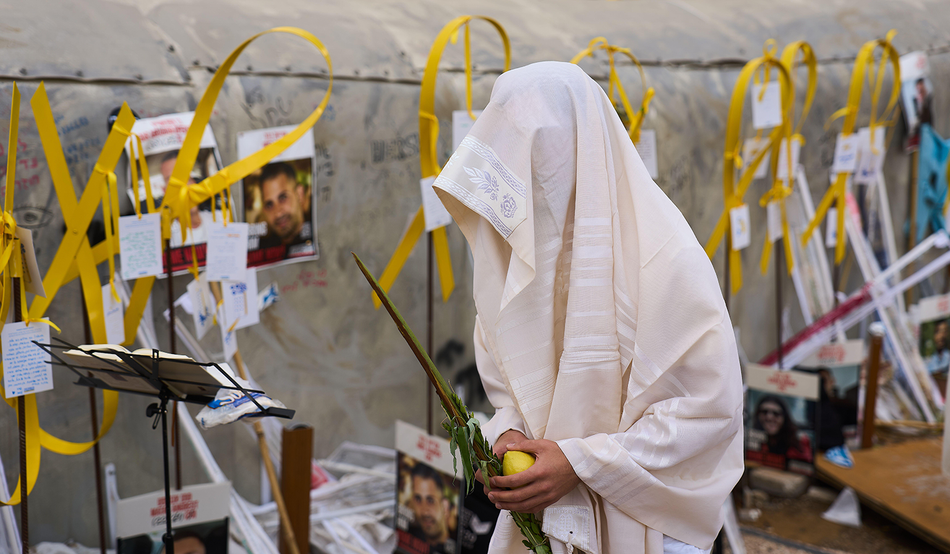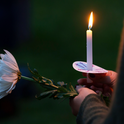The scene in Hostages Square, Tel Aviv, on Thursday afternoon was one of nervous relief rather than joy. There had been too many false dawns for anyone to start unbridled celebrations.
The giant digital clock, when I dropped by, recorded 733 days, 11 hours and 47 minutes since 251 hostages were snatched in October 2023. Crowds milled aimlessly around; reporters scanned their mobiles for updates; the merch stalls were doing good business for hostage T-shirts, coffee cups and key rings. Two women took it in turns to hold a giant placard proclaiming: “We love Trump. He who saves one life saves an entire world.” Well, perhaps.
I stooped my way through the “tunnel experience”—an art installation claiming to simulate the underground experience of the hostages—and paused to watch a circle of relatives quietly dancing and singing. A former hostage, Omer Shem Tov, cautioned the crowd against too much hope. “With all that joy, I have to say: it’s not over yet.”
The phrase of the moment was: “It’s hard to breathe.” Almost everyone in the square was, if only metaphorically, holding their breath.
Hours earlier, Donald Trump had posted the promise of a “Strong, Durable and Everlasting Peace.” But, with all respect to the current holder of the office, Trump is not the first US president to tread this rocky path and the precedents are not encouraging. Everlasting is a very long time.
Analysts who have been following this saga for rather longer than Trump are used to poring over fine detail, but there’s not much of that on offer. Which makes the analysts even more cautious. Will the dead hostages be brought out as well as the live ones? What happens if the Israeli Defence Forces (IDF) go in for some last minute “mopping up,” as sometimes happens at the 11th hour of such negotiations? Could that scupper the entire fragile deal?
In the absence of small print, the analysts turned to the winners and losers. It would be churlish to deny Trump his moment, though people reasonably asked what took him so long to show Bibi Netanyahu who’s boss. Long-time Bibi watchers marvelled at how the Israeli prime minister had managed to both suck up to his American counterpart while slightly distancing himself from some aspects of the deal, notably the release of as many as 1,700 Gazans detained in the past two years.
And even seasoned Bibi watchers secretly admired the ruthless way he sidelined his two hard-right coalition partners, Bezalel Smotrich and Itama Ben-Gvir. “For two years, he hid behind them when it suited them, and tricked them into believing they were calling the shots,” one senior Israeli editor told me. “And now, all of a sudden, they’ve learned they’re not.”
The unappetising pair may now find themselves out on their ears, just as Hamas came in from the cold, its negotiators perhaps relishing the photo opportunities in Sharm el-Sheikh as the initial heads of agreement were signed. They may well, too, consider themselves winners in a somewhat morbid fashion.
With luck, the ceasefire will hold and the hostages—both dead and alive—will be returned to Israel. But beyond that, few people yesterday were holding out much long-term hope for the everlasting.
In the end there are only three possible endings to this story. The first is a two-state solution in which the states of Israel and Palestine learn to live harmoniously alongside each other. But the facts on the ground suggest it may be too late for that, as I saw for myself this week on the road from Tel Aviv to Jenin. Which Israeli prime minister will have the will or the ability to force the increasingly uninhibited settler movement from the territorial gains it seemingly makes by the day?
The so-called one-state solution—in which Arab Israelis and Palestinians become second-class citizens in a Jewish state—looks equally doomed. Which leaves a kind of pre-massacre status quo in which Palestinians and Jews live uneasily side by side, but without any formal agreement. It’s called “managed conflict” and, for many who preferred not to think too deeply, it seemed to be working just fine—until a brutal awakening on 7th October 2023.
Once the hoped-for celebrations have died down next week, Netanyahu faces an uncomfortable reckoning. For two years he has kept the world’s press out of Gaza, while at the same time his army is accused of systematically killing any local reporters or photographers.
But one day soon—if things go to plan—the world’s press will be free to roam the devastated rubble of what was once Gaza. They will see mass malnourishment, smell decomposing bodies trapped in the ruins, meet traumatised children, debrief exhausted medics—and much, much more. They will record the ease with which so much was destroyed while questioning whether anyone has a remotely realistic plan to rebuild Gaza.
So Netanyahu and Trump may bask in short-term glory if all goes to plan next week. There will be joy, at least in the homes of the 20 or so hostages who may still be alive. But the slightly edgy nervousness in Hostages Square may be a better-calibrated reaction for what lies ahead.













